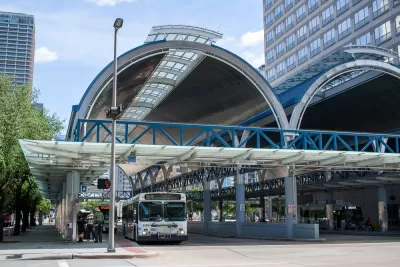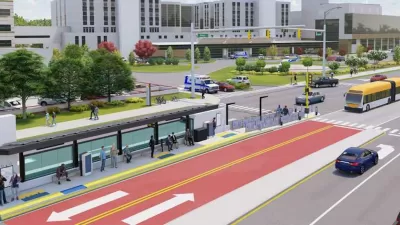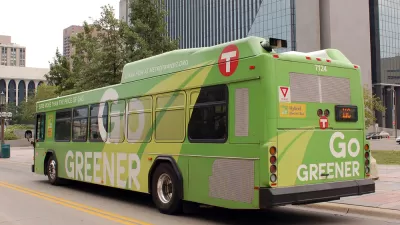The Houston Chronicle editorial board comes out in support of a proposed 25-mile bus rapid transit line, arguing it would provide essential service to transit-dependent residents.

The Houston Chronicle editorial board writes in support of the proposed University Line, which, at 25 miles, would be one of the nation’s longest bus rapid transit (BRT) lines. “A future where Houstonians won’t have to be tethered to a car for their daily commute isn’t just some urbanist fantasy; it’s a necessity for the city to stay competitive with its big-city rivals,” the board writes.
The University Line “connects several of Houston’s biggest downtowns. It connects Metro’s existing investments, making the system work better as a whole. And, finally, it will improve the lives of Houstonians who either leave their cars at home or must rely on transit.”
The project has its critics, who say the line won’t get enough ridership to justify the cost of construction, will disrupt traffic, bring gentrification, and negatively impact local businesses. While the board acknowledges that “Some of these concerns are reasonable,” they insist that the connectivity that the University Line would provide would open up public transit opportunities for many more Houstonians.
Additionally, “Higher and higher ridership isn’t the only goal. The people who consistently use Metro — lower-income commuters who can’t necessarily afford a car or have the ability to drive one — remain reliant on it.” And at $1.5 billion, the cost of the University Line pales in comparison to the $12.5 billion planned for highway expansion.
FULL STORY: Editorial: Metro’s University Line will give Houston transit badly needed reach.

Planetizen Federal Action Tracker
A weekly monitor of how Trump’s orders and actions are impacting planners and planning in America.

Maui's Vacation Rental Debate Turns Ugly
Verbal attacks, misinformation campaigns and fistfights plague a high-stakes debate to convert thousands of vacation rentals into long-term housing.

Restaurant Patios Were a Pandemic Win — Why Were They so Hard to Keep?
Social distancing requirements and changes in travel patterns prompted cities to pilot new uses for street and sidewalk space. Then it got complicated.

In California Battle of Housing vs. Environment, Housing Just Won
A new state law significantly limits the power of CEQA, an environmental review law that served as a powerful tool for blocking new development.

Boulder Eliminates Parking Minimums Citywide
Officials estimate the cost of building a single underground parking space at up to $100,000.

Orange County, Florida Adopts Largest US “Sprawl Repair” Code
The ‘Orange Code’ seeks to rectify decades of sprawl-inducing, car-oriented development.
Urban Design for Planners 1: Software Tools
This six-course series explores essential urban design concepts using open source software and equips planners with the tools they need to participate fully in the urban design process.
Planning for Universal Design
Learn the tools for implementing Universal Design in planning regulations.
Heyer Gruel & Associates PA
JM Goldson LLC
Custer County Colorado
City of Camden Redevelopment Agency
City of Astoria
Transportation Research & Education Center (TREC) at Portland State University
Jefferson Parish Government
Camden Redevelopment Agency
City of Claremont





























